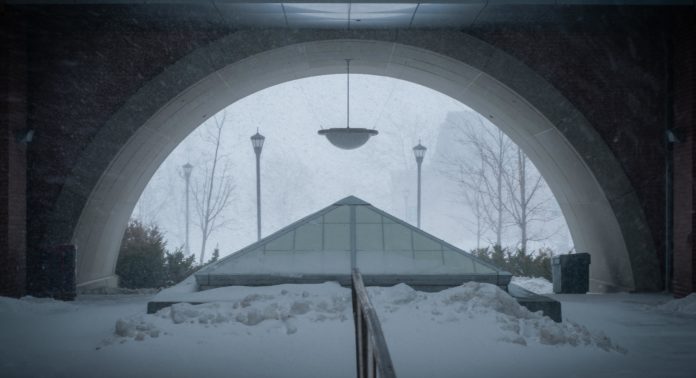

Political science professor Thomas Bateman plowed through his snow-covered driveway on Jan. 23 before hopping on his bike, trekking across an unplowed Westmorland Street bridge sidewalk, to make it to St. Thomas University.
“I had to push my bike across that dumb bridge,” he laughed. “But I’m undaunted in the eternal quest for education.”
Bateman was sitting in his office on campus when STU announced at around 11:42 a.m. that it would close for the remainder of the day at 12:30 p.m.
He was supposed to teach a great books class at 12:30 p.m.
“I didn’t have any big shot of resentment or anything like that; just disappointment that another day will sort of go by,” said Bateman.
It marked STU’s third weather-related school closure this semester. The school closed again on Jan. 26 for the same reason.
Professors have now begun wondering if students could attend classes online when faced with snow days, in the wake of the COVID-19 pandemic and the amount of time students spent online.
“We are now facing the prospect of some lost time that could affect the running of courses and covering material,” said Bateman.
When STU closed because of inclement weather on Jan. 26, Bateman held a one-hour live lecture at the regularly scheduled time for his intro to law, politics and society class and posted a link online so students could watch asynchronously.
Jeffrey Carleton, STU’s associate vice-president of communications, said with the unprecedented amount of snow days this year and the history of online classes in recent years, some faculty are wondering what online coursework they could do.
“When you’re teaching synchronously or asynchronously, it gets a little complicated,” he said.
Although people may have been online during the COVID-19 pandemic, Carleton said some students had unequal access to the internet, so they relied on STU’s computer labs. Some people may have intermittent internet service, and during a storm, there could be power outages.
On top of this, some staff and students have childcare responsibilities when schools and daycares close.
Carleton added there’s also a general confusion when the school suddenly closes, which would make it difficult for people to plan to accommodate.
“All of those factors lead us to believe that having one policy creates the least problems, the least pitfalls for students,” Carleton said.
However, Carleton said Kim Fenwick, STU’s vice president of academic and research, emailed faculty about the issue that explained professors can choose to make asynchronous course material available online.
“In the meantime, we’ll look at the possibility of developing a more formal policy knowing that [online teaching] is more complicated than it appears,” said Carleton.
